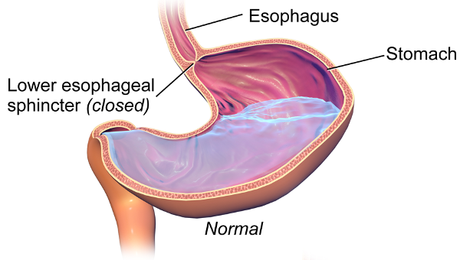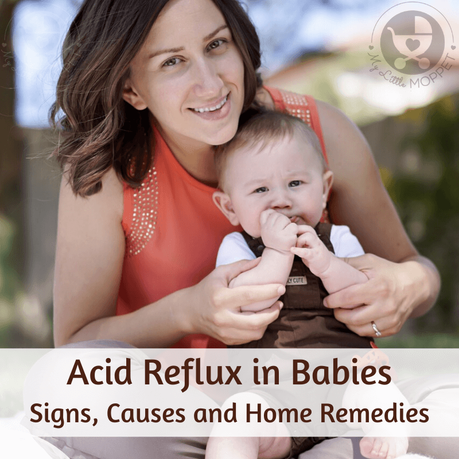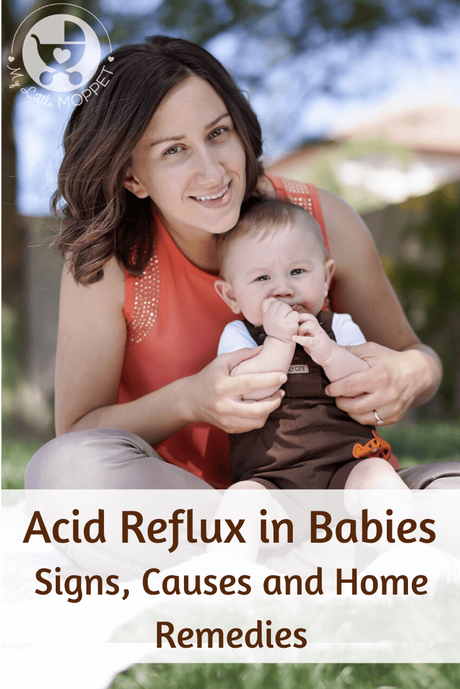November 13, 2019 Leave a Comment
Spitting up milk is something all babies do, but it can worry parents. Here is everything you need to know about signs & remedies for acid reflux in babies.
Have you ever eaten something super spicy and then experienced an uncomfortable burning sensation in your chest? Well, that was either heartburn or reflux, depending upon how uncomfortable it was!
Most of us are familiar with this feeling, but when we talk about acid reflux in babies, it’s confusing – after all, when was the last time you saw a 7 month old polish off a plate of spicy biryani?
But the fact is that even infants suffer from acid reflux, and the reasons may not be the same as those for adults.
What is Acid Reflux?
The lower end of the food pipe has a muscle called the lower esophageal sphincter, or LES. This muscle opens or relaxes to let food pass into the stomach and then closes or contracts to stop anything moving back up the wrong way. When this muscle does not close completely, liquid or stomach acids can move back into the food pipe and into the mouth. This is called acid reflux or gastroesophageal reflux (GER).

In newborns and for about six months after birth, the LES muscle is weak, and doesn’t do a good job of preventing things moving back into the food pipe. That’s why babies are prone to ‘spitting up’ a little of what they last ate along with some stomach acids.
Acid reflux is generally strongest in babies around 3-4 months of age. Some babies may spit up just once a day, while others may be more frequent.As the baby gets older and the muscle gets stronger acid reflux decreases and usually disappears by 18 months.
Acid Reflux or GER is not to be confused with GERD, which stands for gastroesophageal reflux disease, a much more serious condition.
What causes Acid Reflux in Babies?
The main reason behind acid reflux in babies is being overfull from feeding. When the stomach is full, there is more pressure on the LES muscle, which releases food and acid back into the food pipe more easily. Other common causes for acid reflux in babies are:
- Lying flat most of the time
- Frequent overfeeding
- A diet that’s mostly liquid
- Being born premature
- A genetically short food pipe
- Family history of reflux
- Food intolerance or allergies
Acid reflux in babies can also be due to other underlying medical conditions such as:
- GERD
- Asthma
- Food pipe disorders
- Developmental or neurological conditions like cerebral palsy
Signs of Acid Reflux in Babies

Acid reflux doesn’t have any major symptoms other than spitting up. Some babies may become fussy, and they may have temporary trouble sleeping at night. The actual spitting up is painless and the baby should seem fine and content even after spitting up.
On its own, acid reflux is absolutely normal and every baby has some sort of reflux during the early months. As long as the baby is feeding properly, growing well, gaining weight and is generally healthy and happy, acid reflux is not a cause for concern. In fact, such babies are referred to as ‘happy spitters’ by doctors.
However, when reflux is accompanied by other symptoms like irritability, poor weight gain or respiratory issues, it could be a sign of GERD, a more serious complication of plain GER, or some other problem in the digestive tract. Take your baby to the doctor if you notice any of these symptoms:
- Difficulty in feeding
- Difficulty in breathing
- Coughing or choking while or after feeding
- Poor weight gain
- Projectile vomiting – forcefully spitting up or vomiting
- Spitting up blood or any yellow-green liquid
- Passes bloody stools
If these symptoms are present, the doctor may use tests like ultrasound, endoscopy or blood and urine tests to determine the actual problem.
8 Home Remedies for Acid Reflux in Babies

1. Breastfeed
As with everything else, breast is best even in the case of acid reflux! Studies show that acid reflux is less prominent in babies who are exclusively breastfed, and even if present, the severity is low.
2. Feed less at frequent intervals
An overfull stomach is one reason for acid reflux in babies. Feed babies a little less, by increasing the frequency of the feed. Feeding on demand rather than on a schedule usually helps to fix acid reflux in babies.
3. Burp frequently
Burping your baby doesn’t just help with gassiness, it also helps with reflux. Burp babies during and after feedings for best results. For formula feeders, burp after every 2 ounces. For breastfeeding babies, burp every time the baby takes a break and lets go of the nipple.
4. Avoid air in the nipple
Avoiding air in the bottle’s nipple is important to prevent reflux. Make sure the nipple is filled with milk throughout the entire feeding. You may have to adjust the bottle’s position to keep the nipple full always.
5. Add a thickening agent
A diet that’s a little less liquid can help if your baby is prone to frequent spitting up. Many mothers find that adding a small spoon of baby cereal to the formula or expressed breast milk helps to keep the food down. The thickness of the food may make it less difficult to pass back into the food pipe from the stomach.
6. Change the mother’s diet
Babies who are exclusively breastfed may react to the foods the mother eats. It may help for the mother to avoid some foods while breastfeeding, especially immunogenic foods, like cow’s milk and eggs, to prevent reflux in their babies.
7. Adjust baby’s position after feeding
Laying baby down flat on the back immediately after feeding can increase the possibility of acid reflux. Instead, it’s better to hold the baby upright for about 30 minutes after a feeding. Then if baby is awake, lay the baby down on the tummy or on the side. For sleeping, it’s always recommended to let babies sleep on their backs to avoid the risk of SIDS. It also helps to keep the baby’s head at a slightly higher angle of about 30 degrees, on beds and changing tables.
8. Change your formula
If you formula feed, consult your doctor about changing the formula brand. It’s possible that something in your current formula is causing your baby to spit up more than usual.
Medicines for acid reflux are not at all recommended for babies, especially since study after study show that they’re ineffective. On the other hand, such medicines may actually have adverse effects, like affecting the absorption of calcium and iron. It can also increase the risk of respiratory and intestinal infections like pneumonia and gastroenteritis, respectively. Gripe water is also not recommended, as there is no evidence to prove its benefits for babies.

Organic · FSSAI Certified · NABL Lab certified Buy Sprouted Sathumaavu Health Mix powder for Babies / Homemade Cerelac Dry Fruits Powder for Babies/Toddlers Pancake Mixes for Toddlers TweetPinShareWhatsAppEmail
Filed Under: Baby, Baby health, Home Remedies Tagged With: babies, baby, baby care, easy home remedies, effective home remedies, health, Home remedies, kids health, remedies, stomach
